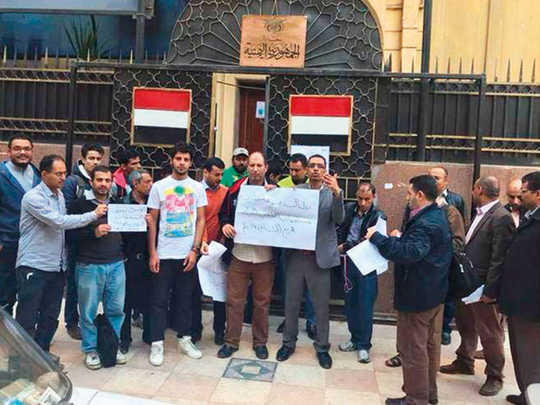
Al Mukalla: Months of delayed stipends and tuition fees by the Yemeni government have sparked student protests at Yemeni embassies around the world.
From Khartoum and Cairo in Northern Africa to Kuala Lumpur in Eastern Asia, disgruntled students are camping out at embassies and vow to stay put until the government sends money.
Wrapped in thick winter coats, a number of Yemeni students braved the winter cold in Moscow recently to camp outside their embassy.
Saleem Mohammad Al Marshahi, a PHD student studying communications at Moscow university, told Gulf News that he and his fellow citizens have been sporadically protesting outside the embassy for more than a year and a half.
“We [briefly] suspended protesting activities when the [Yemeni] ambassador agreed to address our problems,” Al Marshahi said in an email interview. The demands include paying stipends on time, adding dozens of students, whose funds were suspended, to the payroll and buying tickets for students who had finished their studies.
When the problem remained unresolved, students reconvened outside the Yemeni embassy in Moscow and decided to stay until their demands had been met.
The ambassador accused the students of undermining his work and tarnishing the country’s image abroad.
In Pakistan, the Yemeni ambassador called the police to evacuate at least a dozen students who had barricaded themselves inside the embassy and refused to leave until they received their money.
Al Marshahi blames the delays on mismanagement and indifference.
Students say that their funds have been delayed for several months since September last year when president Abd Rabbo Mansour Hadi moved the headquarters of the country’s central bank to Aden.
Hadi’s decision was aimed at stopping the Iran-backed Al Houthis from using the bank’s reserves to fund their war on the government.
The payments were always delayed, but since the shift in central bank headquarters students have say the waiting period has become longer.
“We have yet to receive the tuition which was supposed to be paid in April,” a postgraduate Yemeni student in Egypt, who declined to be named, told Gulf News.
He said that he was forced to pause his current scientific research for his thesis because he could not afford to buy the needed materials.
Some students have been suspended from universities until their tuition is paid.
Others, who have no money to eat, say they are living off of the goodwill of friends and strangers.
Many are stuck in countries, unable to afford the plane ticket back home.
The students have also set up a Facebook page — which has got more than 10,000 likes — to publicise their dire situation.It’s the platform where they share their stories and photos of their protests.
Yemen’s ministry of higher education, Hussain Baslama, who is responsible for handling the problems of government-funded students overseas, did not answer Gulf News’ calls to respond to students’ accusations.
However, a statement carried by the state-run Saba news agency reported in September said that the internationally-recognised government wired $17 million (Dh62 million) in overdue tuition payments to the country’s cultural attaches worldwide.
According to the students, the sum went towards payments for the first quarter of the year and did not cover the following quarters.
The government is unlikely able to pay the tuitions for the foreseeable future due to the dire financial situation the war-torn nation is experiencing.
The little revenue that has come in from taxes and selling oil goes to paying public servant salaries.
The government announced in October they would suspend overseas scholarships for two years.
An Al Houthi coup in 2014 saw the Iran-backed militants take over large swathes of Yemeni territory.
Hadi, who was placed under house arrest, later escaped and set up temporary government headquarters in Aden.
In 2014, Saudi Arabia formed an Arab coalition to intervene in the war, backing Hadi.
The coalition was able to reverse Al Houthi gains in the country and liberate 85 per cent of the country; however, main population centres, including the capital, remain under rebel control.












